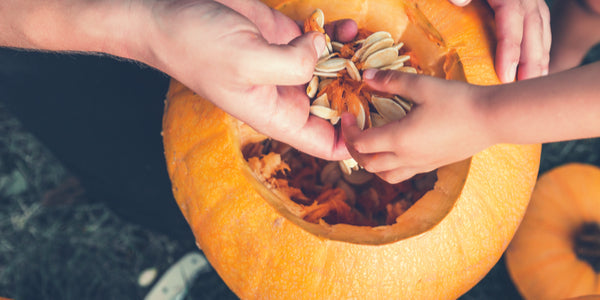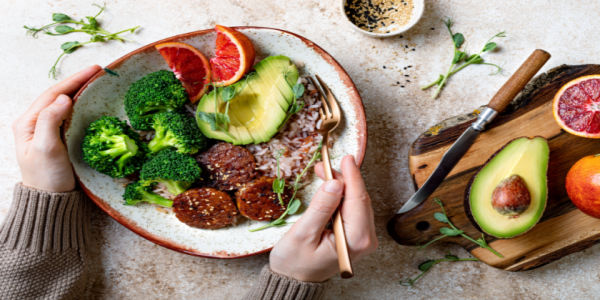
Each year individuals get excited about that notorious fall food... Pumpkin!
Pumpkin pie, pumpkin spice latte, pumpkin oatmeal... You name it, there is some sort of pumpkin variation.
But those nutritious pumpkin seeds, also known as pepitas, tend to take the back burner... So next time you carve that jack o' lantern, let pumpkin seeds shine this fall season!
15 Pumpkin Seed Benefits & Healthy Recipes
Curious about the health benefits of pumpkin seeds and how to use them? We have 15 nutritious and delicious reasons to eat pumpkin seeds!
Pumpkin Seeds Nutrition Data
Like most nuts and seeds, pumpkin seeds are mostly a fat source with significant protein and a small amount of carbohydrate.
But the fat content should not be a reason to shy away from (pumpkin) seeds, as they offer those notorious healthy fats. These specifically monounsaturated and polyunsaturated fats that are essential to health.
Based on ¼ cup (30 grams), the specific nutrient profile of pumpkin seeds includes the following:
• Calories: 180 calories
• Protein: 9 grams (g)
• Total fat: 14 g
• Saturated fat: 3.5 g
• Monounsaturated fat: 4 g
• Polyunsaturated fat: 6 g
• Carbohydrate: 4 g
• Dietary fiber: 3 g
Pumpkin seeds are good sources of other nutrients including potassium, iron, magnesium, zinc, copper, and selenium.
The rich nutrient profile may lead to these health benefits of pumpkin seeds:
1. Including pumpkin seeds in a balanced diet may help manage weight.
Fiber and nutrient-rich foods are shown to contribute to a healthy weight or body mass index (BMI).
A plant-based diet may provoke weight loss with its emphasis on minimally processed foods from whole grains, fresh produce, nuts, and seeds.
2. Pumpkin seeds have many heart-healthy properties.
Pumpkin seeds support heart health in a number of ways thanks to certain nutrients they provide. These specifically include fiber, magnesium, omega-3s, and iron:
• The fiber content may aid in cholesterol reduction, thus reducing the risk of heart attack and stroke.
• Magnesium may lower hypertension, or high blood pressure, and the risk of coronary artery disease (CAD).
• Omega-3 fatty acids, a type of polyunsaturated fat, have shown to be heart-protective and lower the risk of associated diseases.
• Iron is imperative in keeping oxygenated blood efficient within the vasculature.
3. Eating the seeds may improve blood sugars.
Controlling blood sugars is important for those with diabetes. And pumpkin seeds may be able to do so effectively.
According to a study in Critical Reviews in Food Science and Nutrition, pumpkin seeds and their dietary components possess hypoglycemic properties and could assist in maintaining glycemic control.
4. Pumpkin seeds can help boost mood.
The seeds contain tryptophan, an amino acid produced into serotonin and also known as the "feel good" hormone. The triggered brain chemical can initiate a calming effect and may lessen depressive feelings.
Pumpkin seeds also contain zinc, a mineral assisting in the conversion of tryptophan to serotonin.
5. The seeds can act as a sleep aid.
Serotonin is further converted into melatonin, also known as the "sleep hormone."
Adequate levels of melatonin are associated with improved sleep patterns, as the hormone regulates and controls sleep and wake cycles.
6. Eat pumpkin seeds to fight against aging.
Relative to its zinc and omega-3 content, pumpkin seeds may diminish aging consequences.
Omega-3 fatty acids may keep cell membranes protected, thus keeping skin cells healthy. Zinc may internally combat against Alzheimer's and Parkinson's disease.
7. The seeds supply nutrients vital to muscle function.
Both potassium and magnesium are vital to the body's muscles.
Potassium is valuable for contracting muscles for efficient use while magnesium aids in the regulation of muscle function.
8. Pumpkin seeds may help boost the immune system.
The antioxidant properties of pumpkin seeds and its zinc content help boost the immune system.
A robust immune system fights strongly against the flu, cold, and other body infections.
9. Pumpkin seeds can support bone health.
While calcium and vitamin D are two nutrients known to support bone health, magnesium also plays a role.
Magnesium is helpful for the absorption and metabolism of calcium. What's more, chronic magnesium deficiency is a risk factor for osteoporosis.
Healthy Pumpkin Seed Recipes
From traditional roasted seeds to a creamy pesto sauce, do not miss out on these healthy pumpkin seeds recipes!
10. Roasted Pumpkin Seeds
Roasting pumpkin seeds is a simple process. Here's how to do it:
• After deseeding the pumpkin, clean them off by separating the stringy pulp from the seeds. Rinse the seeds under cold water and shake dry.
• Preheat oven to 300°F then spread seeds on a non-stick baking sheet. Roast for 30 minutes.
• Toss warm seeds in olive oil, salt to taste, and desired seasonings and spices. Return back to sheet and oven until golden brown, roughly 15 to 20 minutes.
Also feel free to use different oils, including coconut oil and pumpkin seed oil. Experiment with seasonings, too, such as garlic powder, cayenne, and cinnamon.
11. Pumpkin Seed Trail Mix
Make a fall-inspired pumpkin seed trail mix and hit the trails while the leaves turn!
Simply combine the roasted pumpkin seeds with other favorite mix-ins. This may include slivered almonds, pistachios, sunflower seeds, and dried cranberries.
Enjoy as-is or add flavor and crunch to a hearty bowl of oatmeal or yogurt parfait.
12. Pumpkin Seed Brittle
Especially during the holiday season, brittle is a common sweet treat to enjoy. However, they tend to be loaded with sugar.
This Triple Triple Brittle limits refined sugar by using a small portion of pure maple syrup. While continuing to offer the desired crunch from pumpkin, sunflower, and sesame seeds. The brittle is also flavored with cinnamon, allspice, ginger, sea salt, and vanilla extract.
13. Pumpkin Seed Muffins
Ditch the dense muffins loaded with refined flours and sugars with a nutritious pumpkin seed muffin.
The recipe lightens up breakfast by using apricots, carrots, almond and coconut flour, and highlights pumpkin seeds themselves!
14. Harvest Pumpkin Seed Salad
Replacing croutons with nuts and seeds is a healthful swap while still offering crunch. And preparing a harvest pumpkin seed salad a simple way to enjoy pumpkin seeds while increasing nutrients.
To prepare, start with a bed of baby spinach and kale. Top with shredded carrot, chopped red onion, dried cranberries, and roasted pumpkin seeds. Dress with olive oil, freshly squeezed lemon juice, and salt and pepper to taste.
15. Pumpkin Seed Pesto
Commonly used with pine nuts, pesto takes a fall twist with this pumpkin seed recipe!
Ingredients:
• 2 cloves garlic
• 2 tablespoons Parmesan-Reggiano, grated
• ½ cup pumpkin seeds, roasted
• ½ cup basil leaves, fresh
• ½ cup parsley leaves, fresh
• 2 tablespoons lemon juice, fresh
• ½ cups olive oil
Instructions:
1. Combine the garlic, cheese, in seeds in a food processor. Process until the seeds are finely ground, about 20 to 30 seconds.
2. Add the basil, parsley, lemon juice, and lemon juice to a food processor. Pulse in the olive oil until the herbs are chopped and oil is just incorporated.
3. Serve or refrigerate for up to two days.
Add pesto to whole wheat pasta noodles, spaghetti squash, or fall roasted veggies including pumpkin itself!






